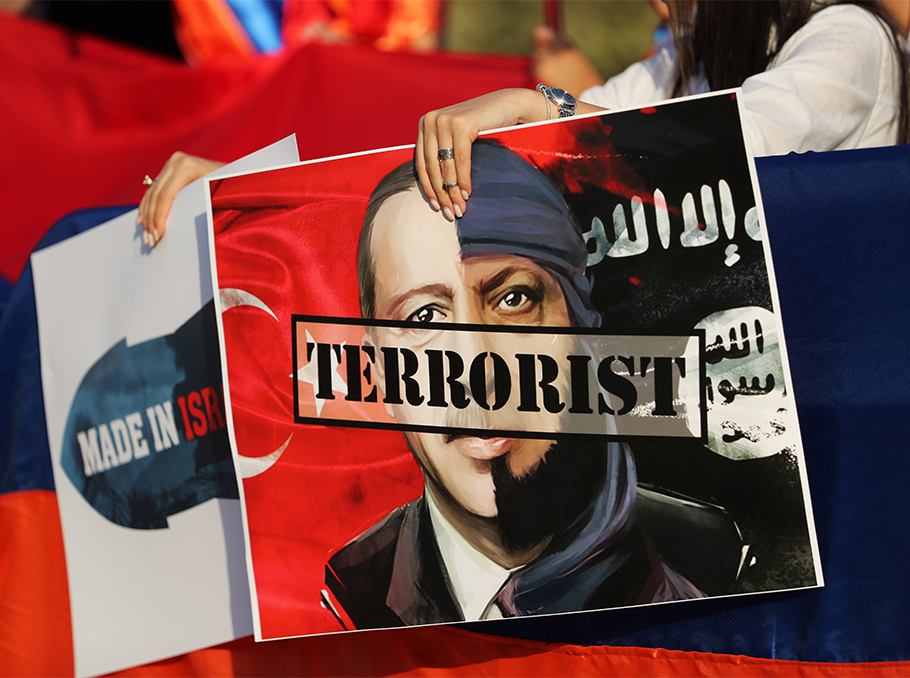Grigor Hovhannissian is Armenia’s former Ambassador to the United States and Deputy Foreign Minister. This article was originally published in the The Jerusalem Post's Opinion section.
Grigor Hovhannissian
Last week, Armenia became the 145th country to recognize the state of Palestine – even as Israel continues its difficult fight against Hamas in Gaza. Last year, Armenians suffered a terrible ethnic cleansing at the hands of Azerbaijan, which was armed to a significant degree by Israel. You’d think the two nations are at odds – and indeed a Jerusalem Post editorial presented things that way. But look beneath the surface and a different story appears.
There is a deep sense of shared history, affinity, and like-mindedness between Armenia and Israel, which endures despite Israel’s military dealings with Azerbaijan and Turkey. There is no underlying antisemitism in Armenia, just as there is no inherent Armenophobia in Israel. Both nations have faced persecution and genocide, defining themselves not territorially but through a duality that exposes them to tough choices during international crises.
These are testing times for Armenian-Israeli relations, but we should navigate these rough waters to harness our many shared assets. Our global communities collaborate in combating extremism and in developing innovations, such as vaccines created at Moderna, a company with Armenian roots. The significant Israeli-Armenian community can serve as a bridge for mutual understanding and cooperation. There is also a growing Jewish community in Armenia, consisting of Russian and Ukrainian citizens who have fled hostility and military drafts. Many of them are contemplating settling down in welcoming Armenia and starting their new lives.

Photo: REUTERS
Strategically, Armenia is undergoing a dramatic geopolitical reorientation, moving closer to the United States and contemplating EU membership while joining regional integration and transport projects that will shape the future Eurasian trade. Israel should consider supporting US policies in this region to help Armenia strengthen its democratic institutions and contribute to reshaping its security strategies. This cooperation will enhance both countries' footprints in the region and beyond, including in India and the Gulf states.
So why did Armenia recognize Palestine?
This recognition came after decades of similar acknowledgments by former Soviet and Warsaw block countries, all of Armenia’s neighbors, and several EU member states. While this move may seem ill-timed, especially for those who have long advocated for closer ties with Israel, it is essential to understand the underlying principles guiding Armenia's decision.
Armenia emerged from the wreckage of the Soviet Empire as an independent nation in a challenging and hostile neighborhood. Historically, Armenia has struggled to ensure its survival and preserve its distinct identity as a representative of Western civilization in the Middle East. Poor in resources and militarily outpowered by regional rivals, Armenia has heavily relied on international legitimacy - the right to self-determination, the prevention of genocide, and the non-use of force in disputes as cornerstones of its foreign policy.
Last September, Azerbaijan attacked and invaded the ethnic Armenian-populated enclave of Artsakh, ending the self-government which had been in place since the collapse of the Soviet Union, and indeed was in effect during the communist period and before. Heavily reliant on Israeli weaponry, the Azerbaijani forces compelled the exodus of the entire population of over 120,000 people.
But the tragic even is not, despite what Israelis might suspect, the reason for the recognition of Palestine.
Rather, this had to do with the country’s self-declared obligations regarding internationally recognized self-determination cases, including Palestine, and potentially Kosovo, South Sudan, and others in the future.
The timing of Armenia's recognition of Palestine has stirred controversy both at home and in Israel. Many perceive that the act during the Gaza conflict sends wrong signals to the belligerents. If this is the case, it is a regrettable externality not anticipated by Armenian policymakers. Armenia's decision might have been influenced by powerful regional actors, highlighting her increased susceptibility to pressures from invigorated neighbors like Turkey after the 2020 Armenia-Azerbaijan war.

Photo: REUTERS
The reaction in Israel has been particularly vehement, with media backlash and stern warnings from the Israeli MFA about potential deterioration in bilateral relations. This reaction contrasts sharply with the responses to similar recognitions by Spain, Slovenia, and Belgium. It raises the question of why Armenia's recognition is perceived as less forgivable than that of the 144 other countries.
Similarly, our Israeli counterparts have often questioned why it is acceptable for other countries, such as Russia and Belarus, to sell weapons to Azerbaijan but not Israel. The answer lies in the expectations and belief that Armenia and Israel, as the only two non-Muslim and democratic countries in the greater Middle East, should not harm each other but work together for regional stability and prosperity.
Armenia’s recognition of Palestine aligns with its long-standing principles and should not be viewed as a detriment to future Armenian-Israeli relations. Instead, both nations to reaffirm their shared values and work towards a more stable and prosperous future together.

















Comments
Dear visitors, You can place your opinion on the material using your Facebook account. Please, be polite and follow our simple rules: you are not allowed to make off - topic comments, place advertisements, use abusive and filthy language. The editorial staff reserves the right to moderate and delete comments in case of breach of the rules.